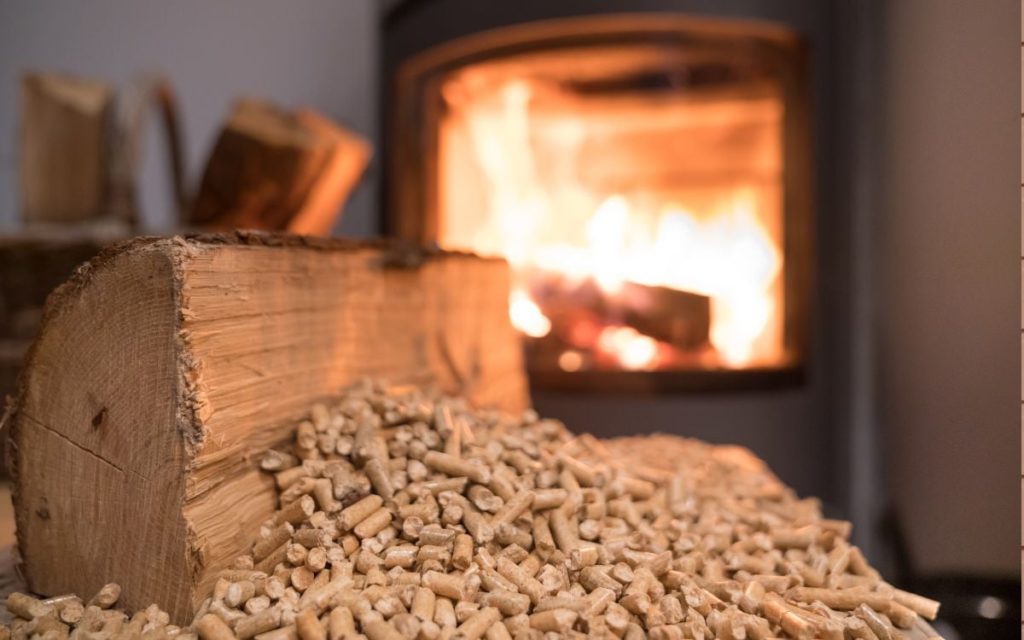Biomass pellet stoves offer a reliable, eco-friendly, and cost-effective solution for heating off-grid homes.
These innovative appliances burn compressed wood pellets to provide consistent warmth and comfort throughout the colder months.
Unlike traditional wood burning stoves, biomass pellet stoves are more efficient and produce less smoke and ash, making them an attractive option for environmentally conscious homeowners.
With their ease of use, automated feed systems, and affordability, it’s no wonder that biomass pellet stoves have become a popular choice among those seeking modern heating solutions for their off-grid homes.
Renewable Energy Source
Biomass pellet stoves burn biomass pellets, which are made from renewable sources such as wood, agricultural waste, or even recycled paper. This makes them a more sustainable option for heating compared to traditional fossil fuels.
These stoves burn biomass pellets, which are made from renewable sources such as wood, agricultural waste, or even recycled paper.
This means that the fuel used to heat your home is derived from organic materials that can be replenished naturally, unlike fossil fuels which are finite resources that contribute to climate change.
Biomass pellets are produced from waste materials that would otherwise be discarded, reducing waste and maximizing the use of resources.
The combustion of these pellets also produces minimal greenhouse gas emissions compared to fossil fuels, making them an attractive option for those looking to reduce their carbon footprint.
Overall, biomass pellet stoves offer a sustainable, eco-friendly, and efficient solution for heating your home.
High Efficiency
Biomass pellet stoves are designed to be highly efficient, with some models reaching efficiency levels of up to 80%. This means that they can provide more heat with less fuel, reducing the amount of waste and minimizing the environmental impact.
Biomass pellet stoves are designed to be highly efficient, with some models reaching efficiency levels of up to 80%.
This means that they can provide more heat with less fuel, reducing the amount of waste and minimizing the environmental impact.
Unlike traditional wood-burning stoves, biomass pellet stoves use a controlled combustion process that burns the fuel more cleanly and efficiently.
As a result, they produce less smoke, ash, and other emissions, making them a more environmentally friendly option for heating.
In addition, the biomass pellets used to fuel these stoves are made from renewable resources such as wood chips, sawdust, and other plant materials, which can help reduce the carbon footprint of your home heating.
With their high efficiency and eco-friendly design, biomass pellet stoves are an excellent choice for those looking to reduce their reliance on fossil fuels and lower their environmental impact.
Customizable
Biomass pellet stoves come in different sizes and styles to suit various home designs and needs. They can be installed in existing fireplaces, or as standalone units.
Biomass pellet stoves offer a range of sizes and styles to suit various home designs and needs.
From compact, wall-mounted units to large, freestanding stoves, there’s a biomass pellet stove that can fit seamlessly into any home.
For homeowners with existing fireplaces, biomass pellet stoves can be easily installed in place of traditional wood-burning stoves, offering a more efficient and environmentally friendly alternative.
Alternatively, standalone biomass pellet stoves can be installed in any location within the home, providing a convenient and efficient heating solution for any room or space.
Regardless of the size or style you choose, biomass pellet stoves offer a versatile and reliable heating solution that can be customized to meet your unique needs and preferences.
Low Maintenance
Biomass pellet stoves are relatively low maintenance compared to traditional wood-burning stoves. They require less cleaning and maintenance, which can save homeowners time and money.
Biomass pellet stoves are designed to be low maintenance, which can save homeowners time and money compared to traditional wood-burning stoves.
Unlike traditional wood-burning stoves, biomass pellet stoves do not require regular cleaning and maintenance of the chimney, as the combustion process is more efficient and produces less creosote buildup.
This means that homeowners can spend less time and money on maintenance and cleaning, and more time enjoying the warmth and ambiance of their stove.
The automated feeding system of biomass pellet stoves ensures a consistent fuel supply, reducing the need for manual adjustments and allowing for a more convenient and hassle-free experience.
Overall, biomass pellet stoves offer a low-maintenance solution for those looking to enjoy the benefits of a wood-burning stove without the extra work and expense.
Consistent Heat
Biomass pellet stoves produce consistent heat, which can help keep homes warm and cozy, even on the coldest days. This is especially important for off-grid homes that rely on alternative heating sources.
Biomass pellet stoves are a reliable and consistent heating solution for off-grid homes that rely on alternative heating sources.
These stoves burn biomass pellets, which are made from renewable resources such as wood waste, agricultural residues, or even food waste.
The pellets are fed into the stove through an automated feeding system, ensuring a consistent and efficient burn.
As a result, biomass pellet stoves produce a consistent and steady heat, which can help keep homes warm and cozy even on the coldest days.
This is especially important for off-grid homes that rely on alternative heating sources, as they often have limited access to traditional heating fuels such as gas or electricity.
The use of biomass pellets as a heating fuel is a sustainable and renewable option, reducing the reliance on fossil fuels and minimizing the carbon footprint of home heating.
Overall, biomass pellet stoves are an excellent choice for off-grid homes seeking a reliable and sustainable heating solution.
Cost-Effective
While the initial cost of a biomass pellet stove may be higher than traditional heating methods, the lower fuel costs and potential government incentives can make them a cost-effective option in the long run.
While the initial cost of a biomass pellet stove may be higher than traditional heating methods, the lower fuel costs and potential government incentives can make them a cost-effective option in the long run.
The cost of biomass pellets is generally lower than other heating fuels, such as oil or propane, which can result in significant savings over time.
According to the U.S. Department of Energy, the average cost of biomass pellets is around $200 per ton, compared to $300 per ton for oil and $400 per ton for propane.
Many governments offer incentives for homeowners who install biomass pellet stoves, such as tax credits or rebates, which can help offset the initial cost of the system.
For example, the U.S. Government offers a 30% tax credit for the cost of a biomass stove, up to $2,000.
By choosing a biomass pellet stove, homeowners can enjoy lower fuel costs and potentially save thousands of dollars over the life of the system.
Carbon Neutral
Burning biomass pellets emits less carbon dioxide than traditional fossil fuels, making them a carbon-neutral option for heating. This is especially important for homes that want to reduce their carbon footprint.
Burning biomass pellets emits less carbon dioxide than traditional fossil fuels, making them a carbon-neutral option for heating.
This is especially important for homes that want to reduce their carbon footprint.
Biomass pellets are made from organic materials such as wood waste, agricultural waste, or even waste cooking oil, which are transformed into a convenient and clean-burning fuel source.
When burned, these pellets release less carbon dioxide than fossil fuels like gas, oil, or coal, making them a more environmentally friendly option.
In fact, according to the Union of Concerned Scientists, burning biomass pellets releases about 10% less carbon dioxide than fossil fuels.
Using biomass pellets for heating can help reduce the amount of waste sent to landfills, as the organic materials are converted into a useful fuel source.
Overall, switching to biomass pellets for heating can be an effective way for homes to reduce their carbon footprint and contribute to a more sustainable future.
Advanced Technology
Many biomass pellet stoves come with advanced technology features, such as programmable thermostats and remote monitoring capabilities, which can enhance the user experience and provide peace of mind.
Many biomass pellet stoves come equipped with cutting-edge technology features that can greatly enhance the user experience and provide peace of mind.
For instance, programmable thermostats allow users to set and maintain optimal temperatures with ease, ensuring a comfortable and cozy living space.
Remote monitoring capabilities allow homeowners to keep track of their stove’s performance and fuel levels from anywhere, providing the convenience and security of knowing that their home is warm and safe, even when they’re not there.
With these advanced technology features, biomass pellet stoves offer a high level of performance, efficiency, and reliability, making them an excellent choice for those looking for a comfortable and sustainable heating solution.
Want More? Dive Deeper Here!
Hey there! If you’re the type who loves going down the rabbit hole of information (like we do), you’re in the right spot. We’ve pulled together some cool reads and resources that dive a bit deeper into the stuff we chat about on our site. Whether you’re just killing time or super into the topic, these picks might just be what you’re looking for. Happy reading!






